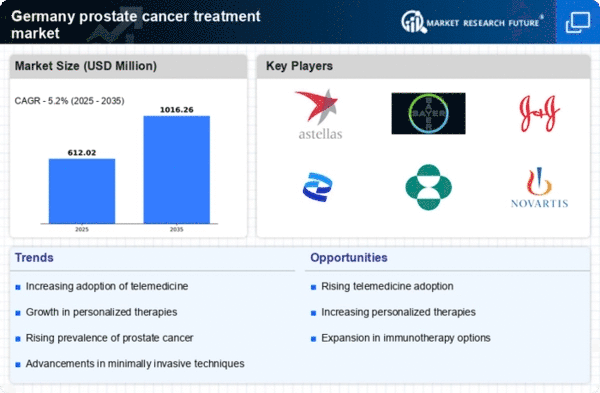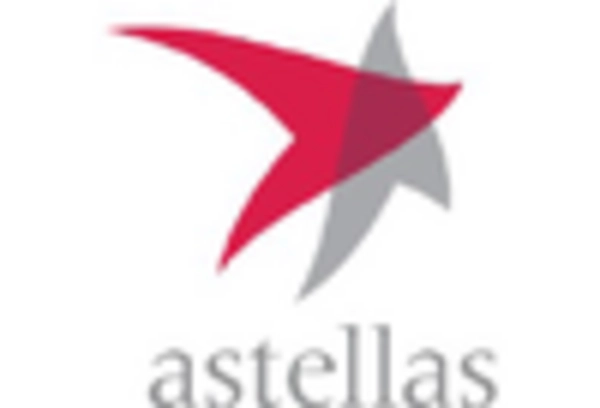Government Initiatives and Funding
Government initiatives and funding play a crucial role in shaping the prostate cancer-treatment market. In Germany, the government has implemented various programs aimed at improving cancer care, including increased funding for research and public awareness campaigns. For instance, the Federal Ministry of Health has allocated substantial resources to support clinical trials and innovative treatment approaches. This financial backing not only fosters the development of new therapies but also enhances access to existing treatments for patients. As a result, the prostate cancer-treatment market is likely to benefit from these initiatives, leading to improved patient outcomes and a broader range of treatment options available to the population.
Increasing Incidence of Prostate Cancer
The rising incidence of prostate cancer in Germany is a primary driver for the prostate cancer-treatment market. Recent statistics indicate that approximately 60,000 new cases are diagnosed annually, contributing to a growing patient population requiring treatment. This trend is likely to escalate as the population ages, with men over 50 being at higher risk. Consequently, healthcare providers are compelled to enhance treatment options, leading to increased investments in research and development. The market is expected to expand as pharmaceutical companies introduce innovative therapies to address this growing demand. Furthermore, the increasing awareness of prostate cancer screening among the population may lead to earlier diagnosis, further driving the need for effective treatment solutions in the prostate cancer-treatment market.
Growing Demand for Personalized Medicine
The growing demand for personalized medicine is reshaping the prostate cancer-treatment market. Patients increasingly seek tailored treatment plans that consider their unique genetic profiles and disease characteristics. This shift towards personalized approaches is supported by advancements in genomic testing and biomarker identification, which enable healthcare providers to offer more effective therapies. In Germany, the market for personalized medicine is projected to grow at a CAGR of around 15% over the next five years. As more patients and healthcare professionals recognize the benefits of personalized treatment, the prostate cancer-treatment market is likely to expand, with a focus on developing targeted therapies that align with individual patient needs.
Rising Awareness and Education on Prostate Health
Rising awareness and education on prostate health are driving factors in the prostate cancer-treatment market. Campaigns aimed at educating the public about prostate cancer risks, symptoms, and the importance of early detection have gained momentum in Germany. This increased awareness is leading to more men seeking regular screenings and consultations with healthcare providers. As a result, the number of diagnosed cases is expected to rise, subsequently increasing the demand for treatment options. Furthermore, educational initiatives are likely to encourage discussions about treatment alternatives, empowering patients to make informed decisions regarding their care. This trend is anticipated to positively impact the prostate cancer-treatment market, as more individuals become proactive in managing their prostate health.
Technological Advancements in Treatment Modalities
Technological advancements in treatment modalities are significantly influencing the prostate cancer-treatment market. Innovations such as robotic-assisted surgeries, advanced radiation techniques, and minimally invasive procedures are transforming patient care. For instance, the adoption of robotic surgery has increased by approximately 30% in recent years, enhancing precision and reducing recovery times. These advancements not only improve patient outcomes but also attract more patients seeking cutting-edge treatment options. Additionally, the integration of artificial intelligence in treatment planning and monitoring is expected to further optimize therapeutic strategies. As these technologies become more prevalent, they are likely to drive growth in the prostate cancer-treatment market, as healthcare providers strive to offer the most effective and efficient care.
















